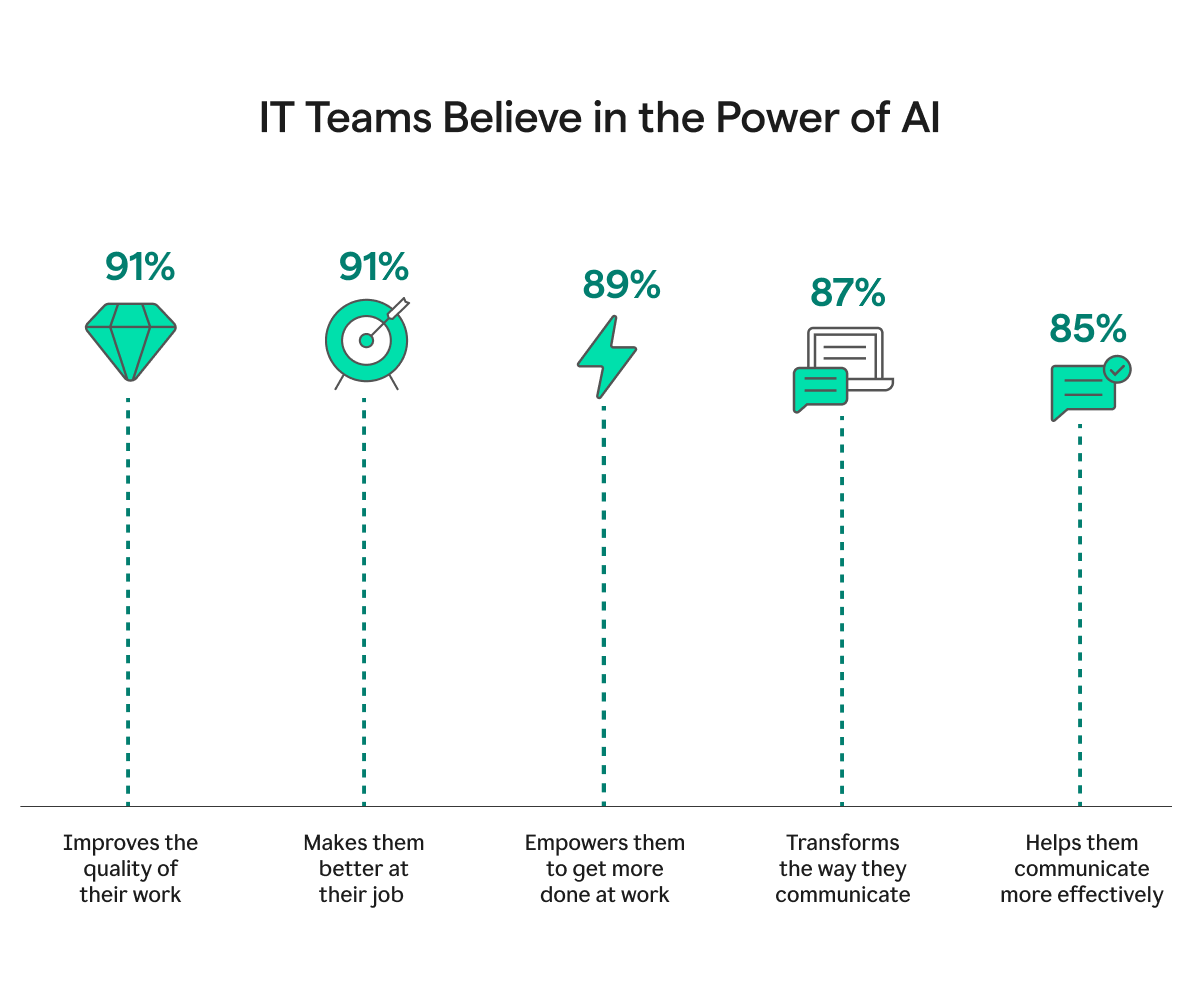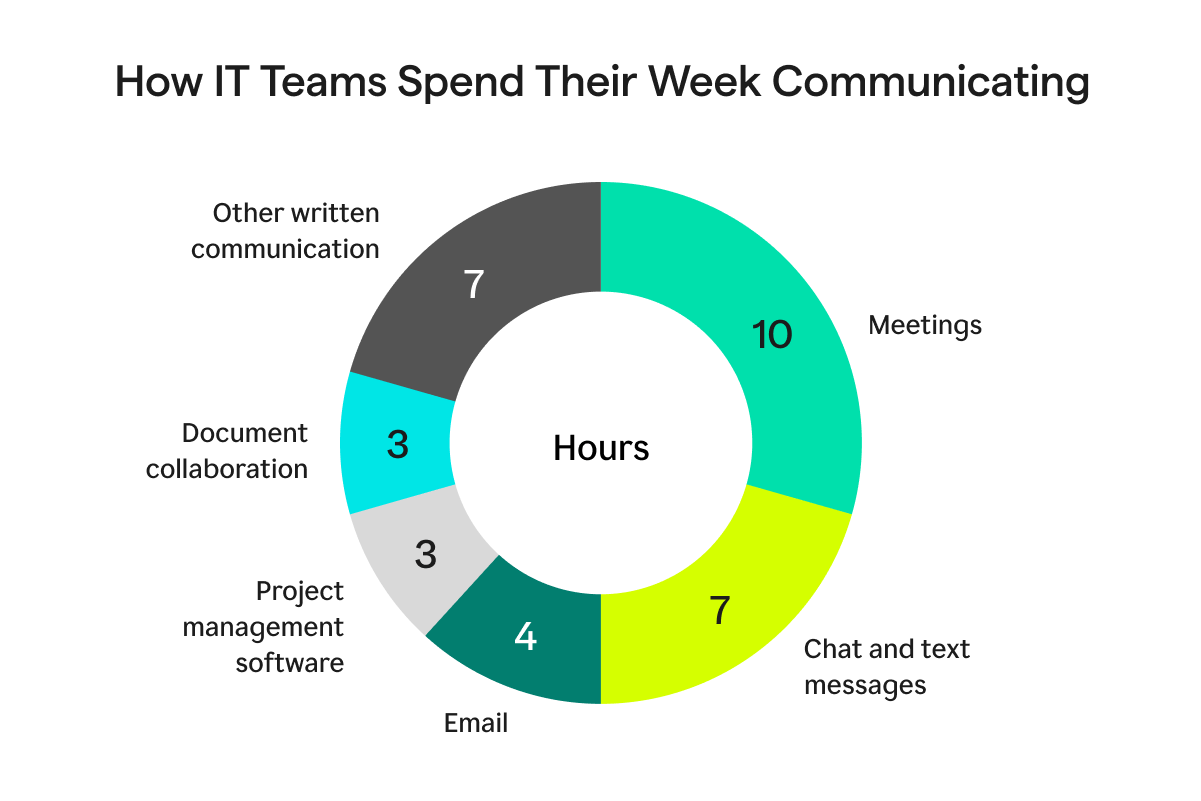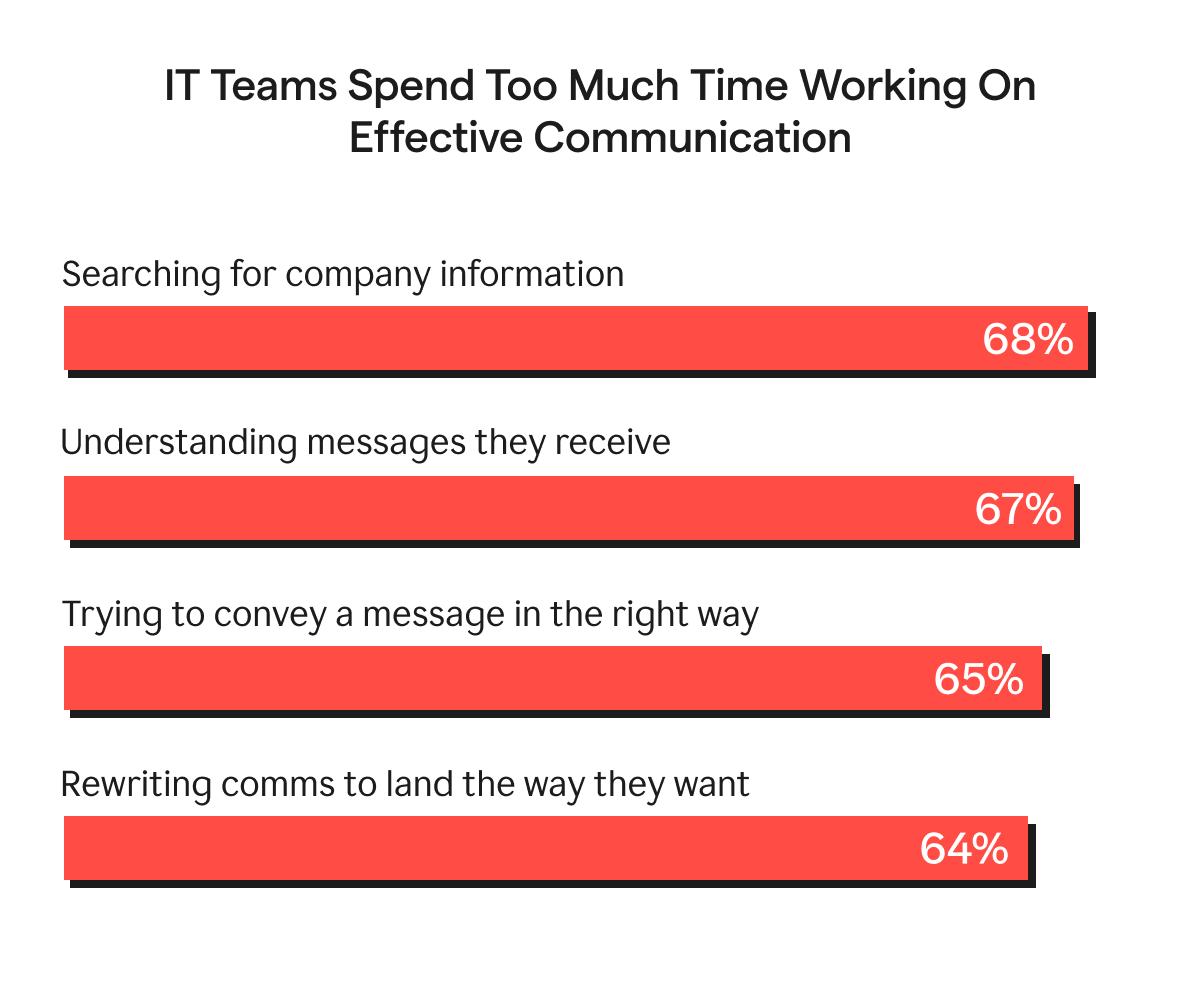Your IT team is the backbone of your organization. They stay busy maintaining your company’s IT infrastructure and the services required for effective day-to-day operations. They deploy new tools and services, organize hardware and software management processes, and provide end-user technical assistance. Not to mention the fact that they own the IT roadmap, all tooling and implementation, and overall IT operations for your company. Because of their many hats, the various stakeholders they support, and the many tools they rely on to do their job well, IT teams face unique communication challenges.
This year’s State of Business Communication report revealed that IT team communication is on the rise, with IT engineers reporting an increase in both communication volume (82%) and channels (77%) over the last year. But this technologically savvy team of early adopters has figured out a way to manage communication overload and save a staggering 10 hours per person every week.
Enter generative AI. It’s no surprise that IT teams are more open than others to adopting AI technology. Their department tends to drive digital workplace advancements and ensure employees have access to the latest and greatest technology to do their jobs. But where exactly does generative AI fit into their daily workflows?
In this blog post, we’ll dive into the latest findings about IT communication and explore how AI is transforming the way this team is getting work done.
Early IT Adopters Reap the Benefits of AI
Unsurprisingly, tech-savvy IT teams have emerged as early adopters of generative AI technology. In fact, more than any other team, 79% of IT engineers report using generative AI at work. This is likely not only for their own reasons but also in the interest of the entire organization. Your IT department should be the experts and power users of any new technology so that they can help evaluate different tools, ensure smooth implementation, and stress test the new technology that they will expect the rest of the company to use.
IT engineers report saving up to 10 hours weekly with gen AI—35% more than the average worker reports saving. On top of that, it also helps to reduce their stress, increase productivity, and enhance their overall job satisfaction. More IT engineers believe in AI’s power to enhance their overall work and transform their communication compared to other teams. Over eight in ten say that gen AI improves the quality of their work, makes them better at their jobs, and empowers them to get more done.

Unlike other teams, IT engineers view AI as a catalyst for enhanced productivity and work quality. They see this new technology as a way to augment their skills, not replace them.
IT Teams Don’t Have Enough Time for Deep Work
While IT teams lead and manage IT infrastructure, they also have an opportunity to lead AI adoption, because the benefits extend to their own team’s communication. Eighty-five percent say that gen AI helps them communicate more effectively at work, something they spend a substantial amount of time doing each week—34 hours, in fact. That’s 85% of the traditional 40-hour workweek, which means that there’s not much time left for the heads-down, deep-concentration work that their role demands.
While they spend less time on written communication than their colleagues on teams like marketing, CX, and HR, they still report spending an average of 17 hours a week on writing tasks and channels. Particularly in IT support roles, these teammates commit hours of their day to communicating with coworkers over chat and email, addressing tech problems, and helping to troubleshoot them in real time.

IT engineers spend the majority of their time supporting colleagues in different departments (60%) and in different time zones (62%). This means that much of their communication (58%) happens asynchronously and across many various channels, which is no surprise given your IT team likely supports a global, hybrid workforce.
While 85% of IT engineers feel confident with this type of communication across time zones and platforms, 81% also say they experience daily miscommunications. This is leaving IT engineers feeling anxious and stressed, which can get in the way of their productivity. Let’s dive deeper into how communication, particularly miscommunication, impacts IT teams.
The Impact of Miscommunication on IT
When communication is effective, IT teams notice. Over half say effective communication increases their work satisfaction (55%) and productivity (53%). But when there’s a breakdown, it takes a toll on IT team productivity and morale.
IT engineers tend to get frustrated by the time it takes to communicate effectively, saying that they spend too much time searching for information, trying to understand others’ messages, and ensuring their words land the way they intend. It’s interesting that they report spending too much time on the work surrounding effective communication. It’s not just writing the messages; it’s the time-consuming nature of ensuring that they understand their colleagues’ or customers’ needs, conveying accurate and easy-to-understand technical information, and doing so with empathy so that the communication is effective. In fact, the fear of miscommunicating leaves over two-thirds (65%) of IT engineers feeling anxious.

It’s safe to assume that effective communication is essential in order for IT teams to do their jobs well. After all, if they don’t understand the problem that someone is having, how are they going to troubleshoot and resolve the issue? If they can’t easily explain a fix for a remote tech problem, how will the person they’re helping be able to apply it themselves?
The time it takes to ensure their communication is effective is time that can’t be devoted to more strategic technical work. This leaves IT teams with a desire for better tools to solve their problems. The vast majority of IT engineers wish their company provided better technology to communicate effectively (83%)—and eight in ten are ahead of the curve, wishing their company was more open to implementing generative AI to help.
Finding the Right AI Tool for IT
While IT engineers are early adopters, many still have reservations about gen AI, so not everyone is taking full advantage of the technology. Three-fourths of IT engineers report having concerns around quality control (78%), privacy (77%), and protecting company IP (75%). It’s also likely that your IT department is managing individual employees’ AI usage, which raises additional concerns over what company data employees may be feeding into insecure LLMs.
So, what’s the path forward?
IT teams report saving an average of 10 hours each week by using generative AI. But not all technology is created equal. Leaders must invest in the right AI technology to meet their IT teams’ needs and help them take back valuable time in their day. When researching tools, you’ll want to look for an AI communication assistant that:
- Everyone within your organization will use so you don’t have to worry about piecemeal adoption
- Is built on best-in-class, enterprise-grade infrastructure, following industry standards to guarantee security, availability, integrity, and adversarial robustness
- Holds itself to the highest standards of data security, giving full control and transparency of data usage to its users
- Blocks sensitive customer data so that it is not read or stored
- Keeps humans in the loop with a responsible AI team focused on ensuring all features are built with fairness and safety
- Undergoes ongoing bias and fairness evaluations to ensure model output is safe
Get even more insights on how your entire organization can communicate better, not more, with generative AI in the 2024 State of Business Communication report.
Curious to learn about trends in your team’s communication trends and AI usage? Check out our blogs that dive into the worlds of CX, marketing, and HR communication.
Note: all hours referenced have been rounded to the nearest whole number.




